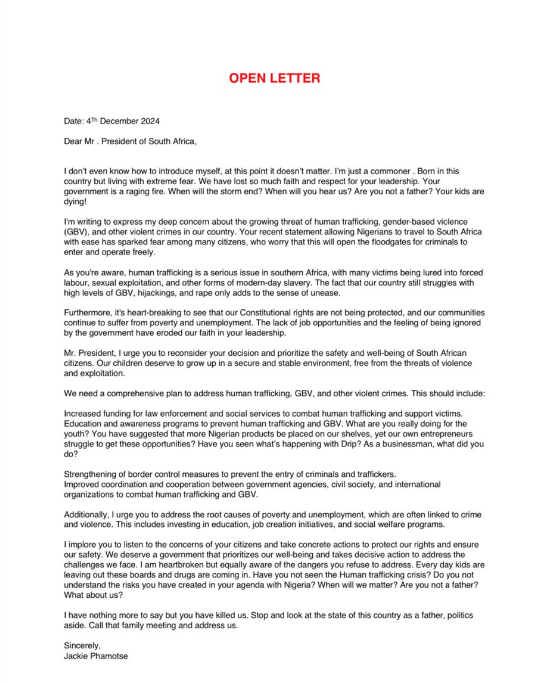Jackie Phamotse, the renowned author, entrepreneur, and social activist, has written an open letter to President Cyril Ramaphosa, expressing her concerns about the recent policy change that simplifies the visa application process for Nigerian tourists. The new measure, aimed at fostering closer ties between South Africa and Nigeria, has sparked a heated debate, particularly regarding its potential security implications. In her letter, Phamotse raised alarm over the growing risks of violent crimes in South Africa, including gender-based violence (GBV) and human trafficking, issues that have deeply affected the country in recent years.
Phamotse began by addressing the deep sense of fear that the visa policy change has triggered among many South Africans. She voiced concern that easing travel restrictions could unintentionally create a loophole for criminals to enter the country, which might exacerbate the already volatile situation. She pointed out that the rising threat of human trafficking, where vulnerable individuals are exploited for forced labour or sexual exploitation, remains one of the country’s most pressing issues. Phamotse argued that any move that could potentially increase the number of people entering South Africa without stringent vetting risks compounding these ongoing challenges.

The author also highlighted the distressing reality of gender-based violence, which has plagued South African society for years. Phamotse emphasized that the country continues to grapple with high levels of violence against women and children, including alarming rates of rape and domestic abuse. She expressed concern that by easing entry into South Africa, more vulnerable individuals could be exploited by criminal syndicates operating within the country, further perpetuating the cycle of violence. For Phamotse, the safety of South African citizens, particularly women and children, must be the foremost priority in any policy decision, and she questioned whether sufficient measures had been put in place to ensure that the new visa policy would not inadvertently exacerbate these crimes.
Additionally, Phamotse voiced her frustration over what she sees as the government’s failure to address the root causes of violent crime, particularly GBV and human trafficking. She pointed out that, despite ongoing efforts, South Africa still struggles with systemic issues such as unemployment, poverty, and a lack of economic opportunities. These social challenges, she argued, contribute to the desperation and vulnerability that fuel crime, making it difficult for many communities to thrive. Phamotse lamented that the government’s policies have not adequately addressed these issues, leading to a growing sense of disillusionment among South Africans who feel abandoned by their leaders.
In her letter, Phamotse also expressed her dismay at the erosion of constitutional rights, particularly those meant to protect citizens from harm. She noted that many communities continue to suffer from violence and exploitation, without sufficient support or protection from the authorities. This, she believes, has led to a sense of powerlessness and fear, undermining the very principles upon which the country was founded. The author pointed out that while the government has a responsibility to ensure safety, economic stability, and social justice, the current climate of insecurity has left many South Africans questioning whether their leaders are truly committed to safeguarding their rights.
Phamotse concluded her letter by urging President Ramaphosa to reconsider the visa policy, at least until more robust measures are put in place to address the concerns she raised. She called for a balanced approach, one that promotes international relations and tourism while prioritizing the security and well-being of South African citizens. She stressed that without addressing the underlying issues of crime, unemployment, and inequality, South Africa will continue to face a multitude of challenges that can no longer be ignored. Her letter serves as both a warning and a call to action, urging the government to put the safety and prosperity of its citizens first.
